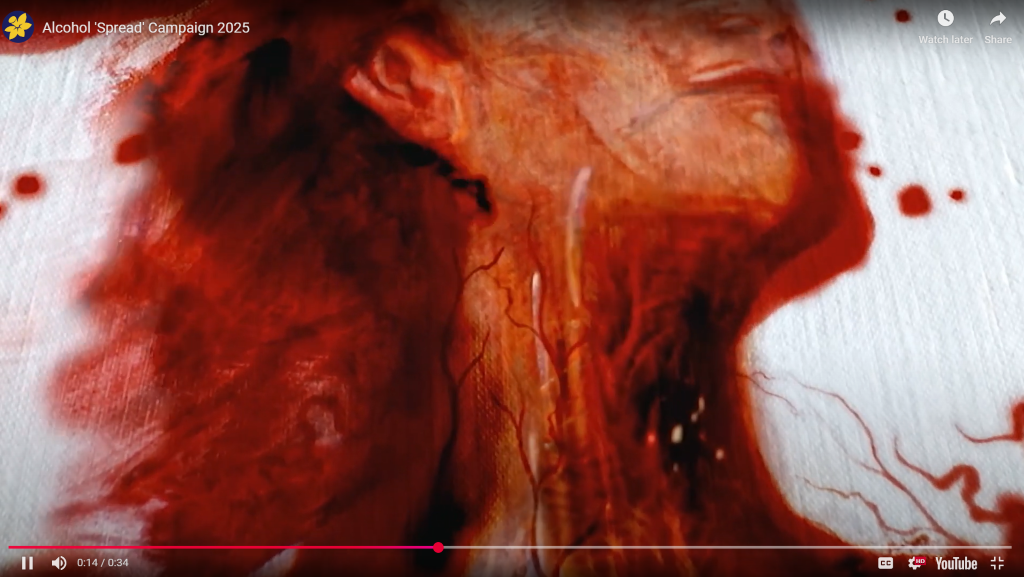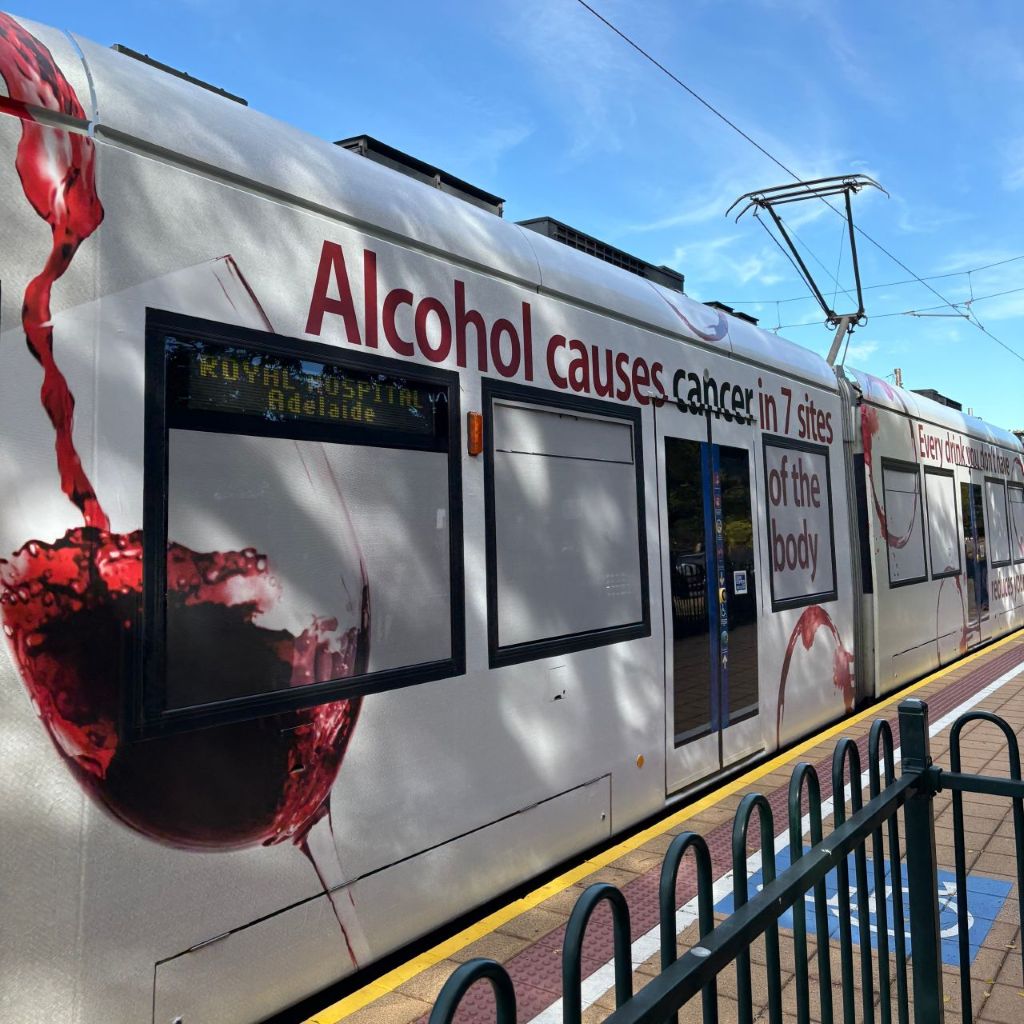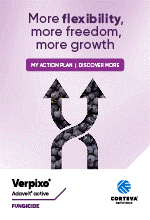Cancer Council SA’s ‘Spread’ campaign wrapped on a tram in Adelaide. Source: Cancer Council SA, LinkedIn
By Meg Riley
A Cancer Council campaign launched this month in South Australia with an emphatic message plastered on trams and played in podcast ad breaks: alcohol causes cancer. Illustrating this campaign is a glass of red wine. The campaign is called ‘Spread’, and its video component features of a glass of red wine falling over and spilling, which the Cancer Council SA said was designed to show the alcohol “spreading to the parts of the body where cancer can occur”.
According to a media release from the Cancer Council SA this month, its motivation for launching the new campaign was “to raise awareness in the community that alcohol can cause cancer and encourage people to reduce their drinking to reduce their cancer risk”.
Watch here: the ‘Spread’ campaign video
“When it comes to cancer risk, there is no safe level of drinking,” said Cancer Council SA’s senior manager of prevention, Christine Morris. “The more you drink, the greater your risk. And it doesn’t matter what type of alcohol you drink – whether it’s beer, wine or spirits – the risk is the same.”

An image of the campaign on a city tram (pictured above) was shared to social platform LinkedIn, where it drew ire from members of the wine industry for its provocative and singular use of red wine as the culprit for alcohol-related cancers.
CEO of Australian Grape & Wine, Lee McLean, said the campaign was concerning.
“Australian Grape & Wine is deeply concerned by the Cancer Council South Australia campaign, which appears to unfairly single out red wine as a cause of cancer through highly emotive and graphic imagery,” said McLean.
“The Australian wine sector supports the responsible and moderate consumption of alcohol, aligned with the NHMRC guidelines, and we encourage balanced, evidence-based public health campaigns.
“We are open to dialogue with public health bodies, but it’s important that campaigns present information in a balanced and evidence-based way that avoids misleading the public or unfairly impacting producers, consumers and regional communities.
“Public health messaging should be rooted in nuance and context. Portraying red wine as something that spreads cancer throughout the body — particularly in the context of moderate consumption — can cause unnecessary fear and confusion. It does not reflect the nuanced advice provided in Australia’s national drinking guidelines. We believe Australians are best served by health information that empowers informed, responsible choices — not by alarmist portrayals that may inadvertently undermine trust in public messaging.”
South Australia’s “lifeblood”
McLaren Vale winemaker Fabiano Minchella drew the industry’s attention to the ‘Spread’ campaign on LinkedIn, reposting it with the observation: “When health messages collide with a state’s lifeblood…”.
Speaking to Daily Wine News, Minchella said that the singling-out of red wine in the ‘Spread’ campaign was neither accurate nor helpful.
““The issue Cancer Council SA is raising is with alcohol consumption broadly—not wine specifically,” he explained. “And yet, by using red wine imagery, the campaign implicitly singles out a particular segment of the alcohol industry while ignoring context, culture, and actual consumption patterns.
“Wine is typically the slowest consumed alcohol, often enjoyed with food, in moderation, and in social or cultural settings that promote responsible drinking. It’s also consumed at lower volumes per capita—around 29 litres per year, compared to 78 litres for beer. While wine does contain more alcohol per volume than beer, that nuance doesn’t justify painting wine as the symbolic “culprit” when the broader concern is over excessive alcohol consumption of any kind.
“When it comes to binge drinking and ‘risky’ consumption patterns, spirits and pre-mixed drinks are far more commonly associated with harm. These are higher in alcohol (and sugar) and consumed quickly, often outside of meal settings, contributing disproportionately to alcohol-related issues.
Minchella said that it was bad enough that the campaign is “unfairly targeting” the wine industry.
“Worse still, it does so without a scientifically grounded or balanced message,” he said. “If the goal is to reduce cancer risk, why not use imagery that reflects the full spectrum of alcohol consumption—or better yet, support it with data on drinking patterns, age groups, or contexts?”
“This campaign could have and can still be an opportunity for constructive public education—promoting moderation, cultural context, and healthy lifestyle choices. Instead, it risks alienating a cornerstone industry in South Australia.
“Lastly, we need to acknowledge the broader picture: cancer rates are rising in parallel with modern lifestyle changes—high consumption of processed food, sugar, seed oils, sedentary behaviour, and the increasing medicalisation of daily life. Alcohol—particularly wine, which has a long, culturally embedded history of responsible use—should not be scapegoated in isolation.
“Something about this feels unbalanced. And I think we need to be speaking up about it.”
A threat to moderation messaging
Felicity Carter, journalist and editorial director of Areni Global, has been one of the most prolific wine industry voices on the matter of wine and cancer messaging. Consulted for this piece, Carter said that the ‘Spread’ campaign was “in line with other campaigns happening around the world”.
“It’s been known for a long time that alcohol is a carcinogen, and it’s been known since at least the 1980s that heavy drinking can contribute to cancer. What’s changing in the messaging is about light to moderate drinking.”
Red wine has long been a poster child for the health benefits of drinking in moderation, and Carter suggested this could be one motivation for its use in the campaign.
“…if they can make people feel that red wine is dangerous, then naturally it will follow that all alcohols are dangerous,” said Carter.
“There is an international push by the alcohol control lobby to get tobacco style cancer warning labels on alcohol, specifically because they know it will change public attitudes,” said Carter. “At the moment, most people want their choices to be respected, but there is a lot of evidence that once there are cancer warnings on products, the public will support increasingly draconian measures against those products.”
“As to what the wine industry should do, I’ve always felt that the Australian wine sector is better placed than others around the world, simply because so many Australian doctors have founded wineries. But individual wineries or wine personnel must not make statements about wine and health unless they have medical qualifications. Where the pushback should happen is at the level of wine industry leadership.”
Wine Australia and South Australian Wine Industry Association were also contacted for this piece, but both said they were not in a position to comment and deferred to Australian Grape & Wine.
Daily Wine News reached out to Cancer Council SA directly for comment, however at the time of publishing has not received a response.
According to the Cancer Council’s website, the ‘Spread’ campaign was developed by the Western Australian Mental Health Commission in 2010, and was revised in 2020.
Cancer Council NSW used the ‘Spread’ campaign on social media in 2022, and stated on its website that the campaign was “effective in raising awareness of the link between alcohol use and cancer risk in Western Australia, Victoria and New South Wales”.
Are you a Daily Wine News subscriber? If not, click here to join our mailing list. It’s free!





















